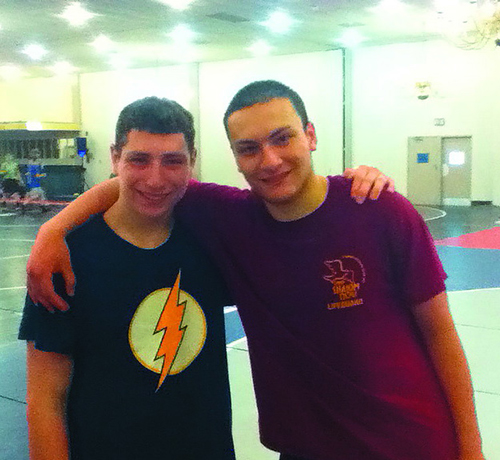
In the world of Jewish sports, wrestling is unusual. The sport has no yeshiva league, nor an extensive network of institutions across the country like basketball does; and it stands out as the only true contact sport at Jewish schools. Keeping in line with the unusual nature of wrestling in the Jewish sphere, the summer potential for involvement is also unique.
There are no religiously minded camps run for wrestling in the summer. So when participants look for an instructional wrestling camp, at first the options appear almost nonexistent. No kosher food, no Jewish friends, no minyan, no shul. There is simply no structure present to support the kind of extra involvement many other sports at yeshivot can provide.
So when the TABC team looked for such a program, it had to look beyond the classic scope of camps. It came in contact with a program that was flexible enough and conveniently located in Allentown, Pennsylvania for two weeks in the summer. The Chertow Wrestling camp, run by former Olympian Ken Chertow, was the right fit.
In a camp that typically held hundreds of wrestlers, an opportunity was found and efforts were made to enable yeshiva campers to stay over the course of one or even two weeks. Arrangements were made and kosher food was brought in pre-wrapped.
A Chabad synagogue was conveniently located a short walk from the location, and provided a great opportunity for a minyan. With a rabbi who was willing to go to great lengths to work around the camp’s schedule, minyan times for both during the week and on Shabbos were organized. As the number of Judaic-minded participants reached 20, a minyan was maintained every day. This arrangement proved to be an unusual link between a sport normally estranged from Jewish life and a yeshiva presence.
The wrestlers hailed predominantly from metropolitan area schools like SAR or TABC, but this year, in an unusual turn of events, six boys came all the way from Ida Crown Jewish Academy in Chicago. The link all had to religion served as an immediate social connection. Soon enough, the divisions between schools, states, and areas of the country broke down, and the participants melded into the “Yeshiva” group. Other campers responded positively to the group, seeing its bond of religion connecting people who recently had never known each other.
Similar to Lefkowitz’s Social Orthodoxy concept, the unique connection the Yeshiva group held enabled a sense of community in a place where many others felt isolated. A public high wrestler said to after one practice that, “It’s really great you guys all connect to each other, it’s something really unique here.” Many wrestlers felt swamped by the number of people present, the intimidating presence of some, and a social isolation limited to the individual’s particular school and team. But luckily, the Yeshiva group had no such limitations.
While wrestling does not have the kind of Jewish-run technique camps that other sports do, this absence does allow for something beneficial. By attending this wrestling camp, the religious cohorts were reminded of their special nature and religious gift—something often forgotten in the Judaic bubble. Wrestling was only a shell, a cover, for that which sets the group apart in the world. From the regular matches the yeshiva teams have with local public schools to the involvement in non-Jewish camps, there is an exposure and reiteration of the Jewish identity.
Wrestling is an opportunity to grapple, both literally and figuratively, with that which makes the Jewish nation special. There is no yeshiva league, no isolated summer camps within which to hone the craft. Instead, participants absorb and engage beyond that, strengthening their resolve and commitment to both life and its rigors.
Aaron Eckstein is a JLBC intern and a rising senior at TABC. This summer, he is also interning at Assemblyman Schaer’s office (36th district) and previously attended the Tikvah Summer Institute.
By Aaron Eckstein










